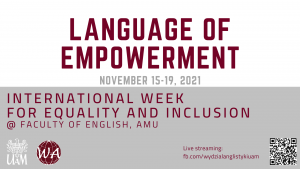The Faculty of English at Adam Mickiewicz University, Poznan, cordially invites everyone to participate in the second edition of our annual seminar series entitled “Language of Empowerment” as part of the International Week for Equality and Inclusion between the 15th and 19th November 2021. Through this event, we aim to raise awareness of the dangers of discrimination and contribute to the global debate on values such as acceptance and equality, in accordance with the UNESCO proclamation that:
“Tolerance is respect, acceptance and appreciation of the rich diversity of our world's cultures, our forms of expression and ways of being human. It is fostered by knowledge, openness, communication, and freedom of thought, conscience and belief. Tolerance is harmony in difference. It is not only a moral duty, it is also a political and legal requirement. Tolerance, the virtue that makes peace possible, contributes to the replacement of the culture of war by a culture of peace." (UNESCO's 1995 Declaration of Principles on Tolerance).
The “Language of Empowerment” at the Faculty of English AMU will feature five 45-minute lectures delivered in English (Monday-Wednesday) and Polish (Thursday-Friday). All lectures will be streamed live via Facebook.
PROGRAM
MONDAY, 15/11/2021, 18:00
Kornelia Boczkowska, Faculty of English, Adam Mickiewicz University
Horsey is not a metaphor: Human-animal relations, gender and the body in experimental film
Despite the growing interest in animal studies, which has continuously challenged the anthropocentrism of the humanities, there are no accounts on how human-animal relations are represented in experimental film or how they link to gender, displacement and the body. In this talk, we will discuss how the work of contemporary experimental makers (Francisca Duran, Barbara Hammer, Kamila Kuc, Frederic Moffet) echoes the animal and corporeal turn in film studies and questions the conventionality of gendered expression through its complex exploration of ecocinematic sensibility and the materiality of the film medium. While mainstream cinema often allegorizes animals as stand-ins for humans by objectifying, victimizing or displacing them from their natural contexts and habitats, experimental film undermines the power of (human) gaze, eliminates the human-animal boundary and equalizes human with nonhuman as it directly connects animal species and plant life to feminine and masculine bodies, desires and identity.
TUESDAY, 16/11/2021, 18:00
Joseph N. Cooper, College of Education and Human Development, University of Massachusetts Boston
Anti-Racism, Inclusive Excellence, and The A.R.C. of Justice Framework: A New Paradigm for Sport Leadership
Internationally the institution and cultural practice of sport has simultaneously yielded benefits and detriments for various groups across diverse backgrounds. The purpose of this presentation is to offer a critical analysis of how sport can be more culturally responsive, inclusive, and transformational where equitable outcomes can be manifested. Key foci areas discussed in the presentation include language, policies, representation, resource allocation, partnerships, and measures of success.
WEDNESDAY, 17/11/2021, 18:00
Magdalena Zabielska, Faculty of English, Adam Mickiewicz University
It gave the impression that I wasn’t welcome: Foreigners’ disempowering experiences with healthcare institutions in Poznań
In this talk I would like to focus on foreigners’ experiences with healthcare institutions in Poznań, as shared during ethnographic interviews, which have been conducted for a year now. As we will see, foreign patients describe regular check-ups and consultations as well as various (emergency) situations during which they sought medical help but could not communicate in Polish, thus feeling helpless at expressing their concerns. The accounts feature experiences ranging from the category of nightmares to relatively positive and include such topics as coping strategies, patients’ personal take on the situation reported and suggestions for improvement. Apart from revealing the experience of the apparent problems which are yet be solved by healthcare institutions, the accounts the interviewees share offer an insight into the way in which they talk about these apparently sensitive issues which concern their wellbeing and feeling of safety.
